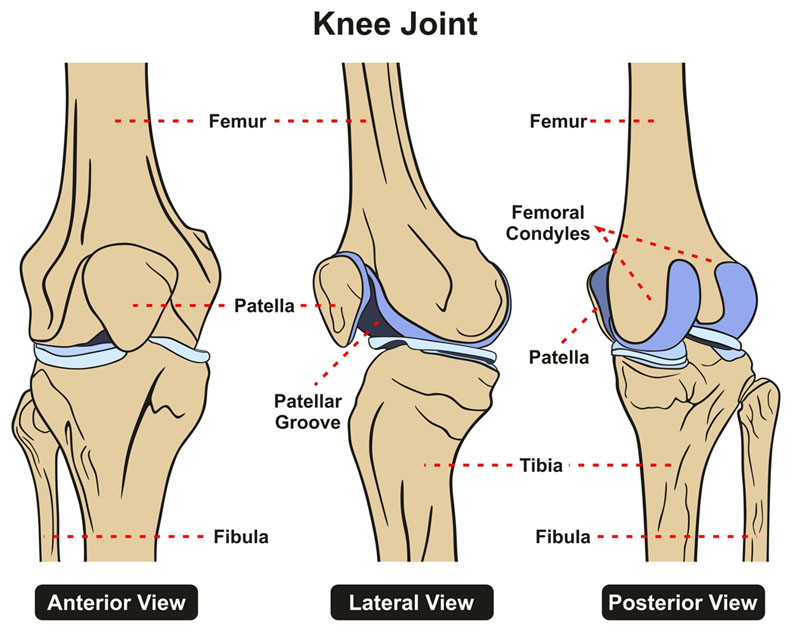Flexibility, strength and stability are everyday motions we often take for granted. But over time, life as an avid runner or a "busy bee" can lead to cartilage damage and chronic pain. And without proper treatment, this pain could get worse.
MACI may be able to help.

MACI is a cutting-edge procedure that restores symptomatic adult knee cartilage defects using a patient's own cells. It is not known whether MACI is effective in joints other than the knee. It is not known whether MACI is safe or effective in patients over the age of 55 years. First, during an arthroscopy a surgeon gathers two to three samples of cells from a patient's damaged cartilage called chondrocytes and sends them to our FDA-licensed lab, where we replicate the cells to form an implant. Common side effects include joint pain, tendonitis, back pain, joint swelling, and joint effusion. More serious side effects include joint pain, cartilage or meniscus injury, treatment failure, and osteoarthritis.
A surgeon will then conduct a follow-up procedure to place the implant into a patient's knee, where it will mature over time to form a durable repair tissue to repair the joint.
Is this treatment option right for you?
Talk with your physician about your specific goals, but these are some of the criteria that affect eligibility:
Age
Are you within the ages indicated for MACI? MACI surgery is approved for patients between the ages of 18 and 55.
Common Symptoms
Common symptoms of knee injuries include the following:
- Sharp or dull pain in the front of the knee
- Knee pain and stiffness after sitting for a prolonged period
- Intermittent swelling, signaling fluid buildup in the knee
- Clicking or crunching sounds with knee movement (crepitus)
- A knee locking or catching sensation triggered by loose cartilage or a jagged cartilage edge
Getting Back to Activities You Love
Knee pain symptoms can interfere with your ability to perform the simplest of tasks, such as walking down the stairs or sitting for long periods. If you continue to run, work out, or play sports through knee cartilage pain, it could worsen and become debilitating.
Location of Knee Cartilage Damage
MACI can treat cartilage damage for all areas of the knee caused by repetitive action or traumatic events. This includes damage to the following locations of the knee:
- Lateral femoral condyle (LFC) and medial femoral condyle (MFC): Femoral condyles are the two ball-shaped bony protrusions located at either side of the end of the femur (thigh bone). The medial condyle is the protrusion located on the inner portion of the bone, while lateral condyle is located on the outer portion. The medial condyle is the most common area for cartilage damage and is also the easiest to repair given its location. Patients with condyle damage may have pain with weight-bearing and complaints of catching, partial locking, and recurring swelling and pain in the location of the damage. MACI is indicated for both lateral and medial condyle damage and femoral condyle damage with bone involvement (where a condyle injury also injures the connecting femur bone).

- Patella: The patella, also known as the kneecap, is the small, rounded triangular bone that rests between the femur and tibia (shinbone). It protects the knee joint and connects muscles in the front of the femur to the tibia. The articular cartilage under the patella and at the end of the femur provides a cushion that allows the femur and tibia to move alongside each other without pain. Articular cartilage damage of the patella will usually occur with direct impact to the front of the knee or dislocation of the patella and can produce recurrent knee pain and instability.
- Trochlea: The trochlea is the groove between the femoral condyles (rounded protrusions) at the front side of the bottom of the femur. This groove keeps the patella in place as it glides against the femur. Damage to trochlear cartilage can cause both anterior (front) and posterior (back) knee pain.
Find a few profiles of patients eligible for MACI below. Do these sound like you?
 Meet Joana, a 52-year-old female with recurrent knee pain from cartilage damage in her left medial femoral condyle (MFC).
Meet Joana, a 52-year-old female with recurrent knee pain from cartilage damage in her left medial femoral condyle (MFC).
- Occupation: Self-employed
- Hobbies: Enjoys hiking and tennis
- Symptoms: Recurrent left knee pain from a hiking fall two years ago
- Prior treatments: None
- Imaging: Revealed full-thickness cartilage damage on the left MFC and indicated moderate compartment narrowing with no malalignment
 Meet Joe, a 44-year-old male with recurrent knee pain from cartilage damage in his right lateral femoral condyle (LFC).
Meet Joe, a 44-year-old male with recurrent knee pain from cartilage damage in his right lateral femoral condyle (LFC).
- Occupation: Nurse
- Hobbies: Enjoys biking, running and hiking
- Symptoms: Recurrent knee pain for six months
- Prior treatments: ACL reconstruction two years prior with chondroplasty for cartilage damage on LFC
- Imaging: Revealed full-thickness cartilage damage on LFC with no significant joint space narrowing or malalignment
 Meet Amanda, a 20-year-old female with knee pain and swelling from knee cartilage damage in the trochlea and patella in her right knee.
Meet Amanda, a 20-year-old female with knee pain and swelling from knee cartilage damage in the trochlea and patella in her right knee.
- Occupation: Student
- Hobbies: Volleyball player
- Symptoms: Pain, swelling, instability >5 years recurrent injury
- Prior treatment: Tibial Tubercle Osteotomy (TTO) and lateral release
- Imaging: Revealed cartilage damage on the trochlea and patella
If you don't treat your damaged knee cartilage, your pain may only get worse. The MACI procedure can help repair, rebuild and regenerate knee cartilage, getting you back to the everyday activities you love.
Please see below for full indication and ISI. Blog posts are intended to provide educational information. Always talk to your doctor with any questions.

